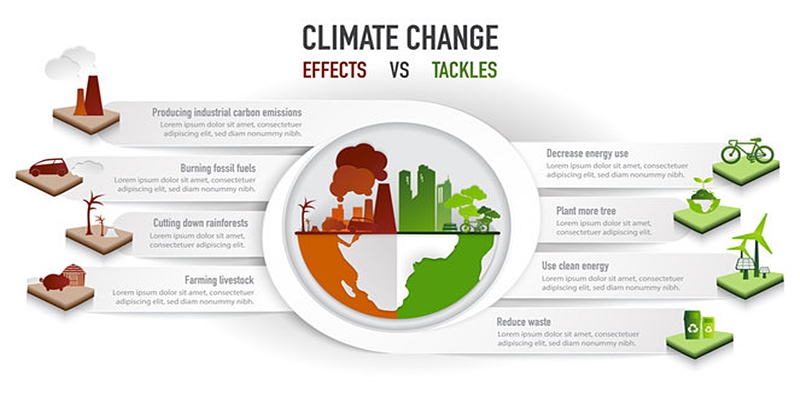Man and Nature: Building a Community of Life Together

It is good to have an in-depth exchange of views with you on climate change, and to discuss ways to tackle this challenge and find a path forward for man and Nature to live in harmony.
Since time of the industrial civilization, mankind has created massive material wealth. Yet, it has come at a cost of intensified exploitation of natural resources, which disrupted the balance in the Earth's ecosystem, and laid bare the growing tensions in the human-Nature relationship. In recent years, climate change, biodiversity loss, worsening desertification and frequent extreme weather events have all posed severe challenges to human survival and development. The ongoing COVID-19 pandemic has added difficulty to economic and social development across countries. Faced with unprecedented challenges in global environmental governance, the international community needs to come up with unprecedented ambition and action. We need to act with a sense of responsibility and unity, and work together to foster a community of life for man and Nature.
We must be committed to harmony between man and Nature.
All things that grow live in harmony and benefit from the nourishment of Nature. Mother Nature is the cradle of all living beings, including humans. It provides everything essential for humanity to survive and thrive. Mother Nature has nourished us, and we must treat Nature as our root, respect it, protect it, and follow its laws. Failure to respect Nature or follow its laws will only invite its revenge. Systemic spoil of Nature will take away the foundation of human survival and development, and will leave us human beings like a river without a source and a tree without its roots. We should protect Nature and preserve the environment like we protect our eyes, and endeavor to foster a new relationship where man and Nature can both prosper and live in harmony.
We must be committed to green development.
Green mountains are gold mountains. To protect the environment is to protect productivity, and to improve the environment is to boost productivity - the truth is as simple as that. We must abandon development models that harm or undermine the environment, and must say no to shortsighted approaches of going after near-term development gains at the expense of the environment. Much to the contrary, we need to ride the trend of technological revolution and industrial transformation, seize the enormous opportunity in green transition, and let the power of innovation drive us to upgrade our economic, energy and industrial structures, and make sure that a sound environment is there to buttress sustainable economic and social development worldwide.
We must be committed to systemic governance.
Mountains, rivers, forests as well as farmlands, lakes, grasslands and deserts all make indivisible parts of the ecosystem. Protecting the ecosystem requires more than a simplistic, palliative approach. We need to follow the innate laws of the ecosystem and properly balance all elements and aspects of Nature. This is a way that may take us where we want to be, an ecosystem in sound circulation and overall balance.
We must be committed to a people-centered approach.
The environment concerns the well-being of people in all countries. We need to take into full account people's longing for a better life and a good environment as well as our responsibility for future generations. We need to look for ways to protect the environment, grow the economy, create jobs and remove poverty all at the same time, so as to deliver social equity and justice in the course of green transition and increase people's sense of benefit, happiness and security.
We must be committed to multilateralism.
We need to work on the basis of international law, follow the principle of equity and justice, and focus on effective actions. We need to uphold the UN-centered international system, comply with the objectives and principles laid out in the UN Framework Convention on Climate Change (UNFCCC) and its Paris Agreement, and strive to deliver the 2030 Agenda for Sustainable Development. We need to each take stronger actions, strengthen partnerships and cooperation, learn from each other and make common progress in the new journey toward global carbon neutrality. In this process, we must join hands, not point fingers at each other; we must maintain continuity, not reverse course easily; and we must honor commitments, not go back on promises.
China welcomes the United States' return to the multilateral climate governance process. Not long ago, the Chinese and US sides released a Joint Statement Addressing the Climate Crisis. China looks forward to working with the international community including the United States to jointly advance global environmental governance.
We must be committed to the principle of common but differentiated responsibilities.
The principle of common but differentiated responsibilities is the cornerstone of global climate governance. Developing countries now face multiple challenges to combat COVID-19, grow the economy, and address climate change. We need to give full recognition to developing countries' contribution to climate action and accommodate their particular difficulties and concerns. Developed countries need to increase climate ambition and action. At the same time, they need to make concrete efforts to help developing countries strengthen the capacity and resilience against climate change, support them in financing, technology, and capacity building, and refrain from creating green trade barriers, so as to help developing countries accelerate the transition to green and low-carbon development.
As we say in China, "When people pull together, nothing is too heavy to be lifted." Climate change poses pressing, formidable and long-term challenges to us all. Yet I am confident that as long as we unite in our purposes and efforts and work together with solidarity and mutual assistance, we will rise above the global climate and environment challenges and leave a clean and beautiful world to future generations.
By H.E. Xi Jinping
President of the People's Republic of China
